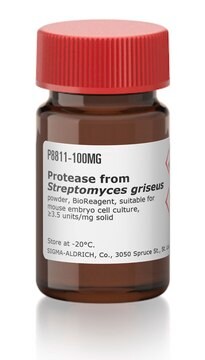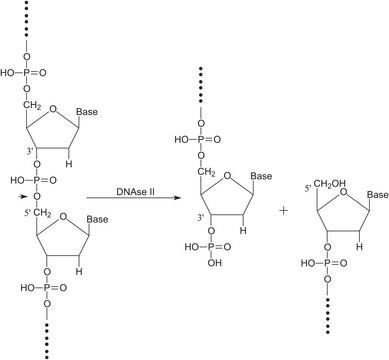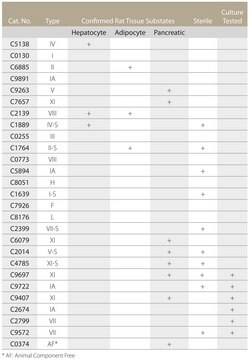D4513
Deoxyribonuclease I from bovine pancreas
Type II-S, lyophilized powder, Protein ≥80 %, ≥2,000 units/mg protein
Synonym(s):
DNase I, Deoxyribonucleate 5′-oligonucleotido-hydrolase
About This Item
Recommended Products
biological source
bovine pancreas
Quality Level
sterility
sterile-filtered
type
Type II-S
form
lyophilized powder
specific activity
≥2,000 units/mg protein
mol wt
~31 kDa
purified by
chromatography
composition
Protein, ≥80%
packaging
vial of ≥10.0 mg protein
technique(s)
DNA purification: suitable
impurities
endotoxin, tested
solubility
0.15 M NaCl: soluble 5.0 mg/mL, clear(lit.)
suitability
suitable for molecular biology
application(s)
diagnostic assay manufacturing
diagnostic assay manufacturing
foreign activity
Chymotrypsin ≤0.01%
Protease ≤0.005%
RNase ≤0.01%
storage temp.
−20°C
Looking for similar products? Visit Product Comparison Guide
Application
Biochem/physiol Actions
Unit Definition
Physical form
Preparation Note
Analysis Note
inhibitor
Signal Word
Danger
Hazard Statements
Precautionary Statements
Hazard Classifications
Resp. Sens. 1
Storage Class Code
11 - Combustible Solids
WGK
WGK 3
Flash Point(F)
Not applicable
Flash Point(C)
Not applicable
Personal Protective Equipment
Certificates of Analysis (COA)
Search for Certificates of Analysis (COA) by entering the products Lot/Batch Number. Lot and Batch Numbers can be found on a product’s label following the words ‘Lot’ or ‘Batch’.
Already Own This Product?
Find documentation for the products that you have recently purchased in the Document Library.
Customers Also Viewed
Protocols
To standardize a procedure for the enzymatic assay of Deoxyribonuclease I.
Our team of scientists has experience in all areas of research including Life Science, Material Science, Chemical Synthesis, Chromatography, Analytical and many others.
Contact Technical Service












